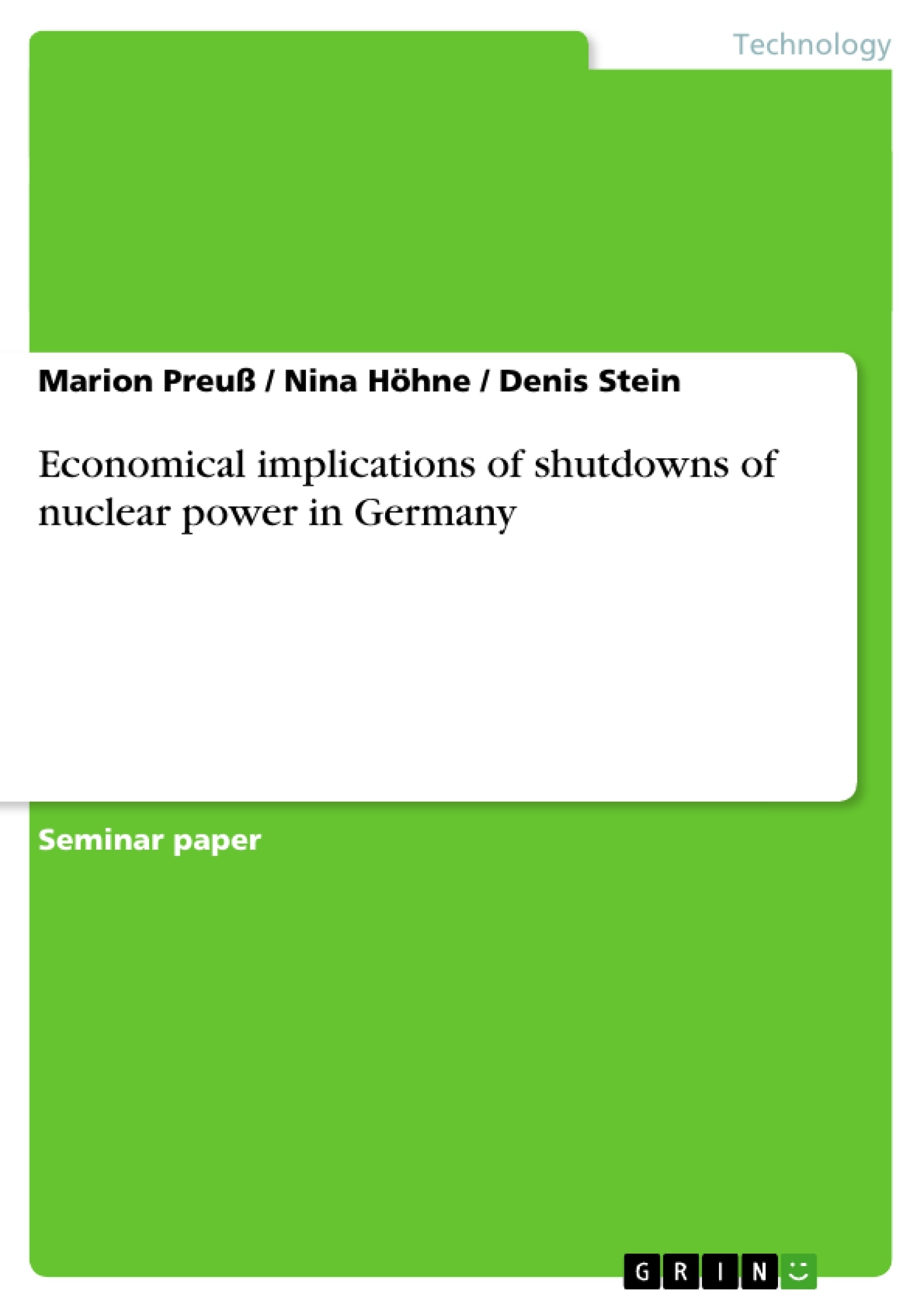Worldwide nuclear power exerts strong pressure on the economic factor of supply and demand. Nuclear power is a cheap and traditional form of energy. Therefore, there is a large international supply with a strong demand for it. Nevertheless, there are also big risks in the production of nuclear power. Nuclear meltdowns with far-reaching consequences have occurred in the past, e.g. the well-known meltdown at Chernobyl in 1986 and the newest disturbance at the Fukushima nuclear power station in Japan in 2011. These have provoked a major global, public discussion on the future energy supply from nuclear power stations. In Germany, 17 nuclear power stations supply most households and companies with energy, and 7 of the oldest nuclear power stations are temporarily recaptured from the electrical network. An important consideration regarding the economical shutdowns of nuclear power stations in Germany dominates public workaday life. The alternatives are renewable energies. However, they supply only a small amount of energy. If there is a consideration to shut down nuclear power in Germany, it is significant to do so in an economical manner.
Inhaltsverzeichnis (Table of Contents)
- Introduction
- Public presentation of the problem
- Goals of the assignment
- Course of analysis
- Nuclear power in Germany
- Background information
- Supply and demand
- Investments and costs of nuclear power
- Employment
- Subventions
- Efficient substitutes: Renewable energies
- Background information
- Supply and demand
- Investments and costs of renewable energies
- Employment
- Subventions
- Switching costs
- Price effects
- Investment costs
- Economic impacts of nuclear power shutdowns
- Cost and price effects
- Production and employment effects
- Total economic effects
- Investments in renewable energies
- Employment development
- Ecological effects
- Deduction of the implications of shutdowns of nuclear power
- Conclusion
- Recommendation
- Future outlook
Zielsetzung und Themenschwerpunkte (Objectives and Key Themes)
The main objective of this work is to analyze the economic implications of shutting down nuclear power in Germany. The analysis explores various aspects of the energy sector, examining both nuclear power and renewable energies. The goal is to provide a comprehensive assessment of the potential impacts of such a decision on the German economy.
- Economic impacts of shutting down nuclear power in Germany
- Comparison of nuclear power and renewable energies in terms of supply, demand, costs, and employment
- Analysis of switching costs and price effects
- Evaluation of investment needs and employment developments
- Exploration of the ecological effects of nuclear power shutdowns
Zusammenfassung der Kapitel (Chapter Summaries)
The first chapter introduces the issue of nuclear power shutdowns in Germany and outlines the goals and scope of the analysis. The second chapter provides a detailed analysis of the German nuclear power sector, examining its role in the energy market, investments, costs, employment, and government subsidies. The third chapter focuses on renewable energy sources as potential alternatives to nuclear power, examining their supply, demand, costs, employment, and subsidies. The fourth chapter analyzes the economic costs associated with switching from nuclear power to renewable energies, including price effects and investment costs. Finally, the fifth chapter examines the overall economic impacts of shutting down nuclear power, including cost and price effects, production and employment changes, and ecological considerations.
Schlüsselwörter (Keywords)
The key terms and concepts explored in this work include nuclear power, renewable energies, energy supply and demand, investment costs, employment effects, economic impacts, switching costs, ecological effects, Germany, and energy policy.
Frequently Asked Questions
What are the main economic impacts of nuclear power shutdowns in Germany?
The analysis examines cost and price effects, changes in production and employment, and the overall impact on the German energy market and economy.
How do renewable energies compare to nuclear power in terms of cost?
The work analyzes investment costs, supply and demand, and government subventions for both traditional nuclear energy and renewable alternatives.
What are "switching costs" in the context of the German energy transition?
Switching costs refer to the economic burden of transitioning from nuclear power to other sources, including price effects for consumers and necessary infrastructure investments.
What triggered the global discussion on nuclear energy supply?
Major nuclear accidents, specifically the 1986 Chernobyl meltdown and the 2011 Fukushima disaster in Japan, provoked significant public and political debate.
How does the shutdown affect employment in Germany?
The analysis explores the decline in nuclear sector jobs versus the potential growth in employment within the renewable energy industry.
- Arbeit zitieren
- Marion Preuß (Autor:in), Nina Höhne (Autor:in), Denis Stein (Autor:in), 2011, Economical implications of shutdowns of nuclear power in Germany, München, GRIN Verlag, https://www.grin.com/document/204758



